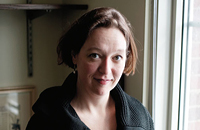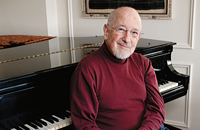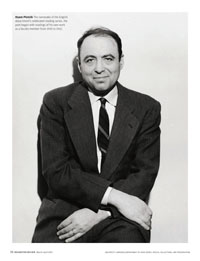Features
The roster reads like a Who’s Who of modern literature: James Baldwin, Ted Hughes, Robert Lowell, Bernard Malamud, Michael Ondaatje, Adrienne Rich, Salman Rushdie, Allen Ginsberg, Rita Dove, J. M. Coetzee, W. S. Merwin, Elizabeth Bishop, John Ashbery, Anne Sexton, and John Updike, to name a few.
Since 1962, more than 300 poets, novelists, and nonfiction writers have been guests of the English department’s Plutzik Reading Series, sharing their work with students, faculty, and area community members in one of the nation’s longest-running collegiate reading programs.
Rochester Poet’s Work Named Among Nation’s Best
 NOTABLE: Grotz is earning accolades for The Needle, her second collection of poetry. (Photo: Adam Fenster)
NOTABLE: Grotz is earning accolades for The Needle, her second collection of poetry. (Photo: Adam Fenster)A 2011 book of poems by Jennifer Grotz, assistant professor of English, is earning national recognition.
The Needle (Houghton Mifflin Harcourt), Grotz’s second collection of poetry, was cited by National Public Radio as one of the five best books of poetry published in 2011, and the Washington Post noted that the collection should establish Grotz “as one of America’s best young poets.” In addition,
her poem “Poppies,” originally published in the New England Review, was selected for inclusion in the anthology The Best American Poetry 2011 (Scribner).
Grotz, who also teaches in the University’s literary translation studies program, is one of four creative writers on the English department faculty who help coordinate the Plutzik series. The others are poet and critic James Longenbach, the Joseph H. Gilmore Professor of English; novelist Joanna Scott, the Roswell S. Burrows Professor of English; and fiction writer Stephen Schottenfeld, assistant professor of English.
Plutzik Memories
 PLUTZIK PUPIL: The poet influenced how Zweig approached his own teaching as a professor. (Photo: Shannon Taggart for Rochester Review)
PLUTZIK PUPIL: The poet influenced how Zweig approached his own teaching as a professor. (Photo: Shannon Taggart for Rochester Review)It’s amazing to me how vivid my memories are of Professor Hyam Plutzik of the English department, even at 81.
When I think about a particularly significant moment of personal growth during my years at Rochester, what comes immediately to mind is not a lecture or a class but Plutzik’s review of the student literary magazine in which I had published a story and some poems.
I was a philosophy major but, like most of my friends, I had literary aspirations—“pretensions” would be a better word. And that is what Plutzik recognized.
I can still recall his exact words in that review: “Mr. Zweig must take care to avoid the least suggestion of pretentiousness in his work.”
Deflating, when I was dying for praise. Oh, there were some favorable comments as well, a concession that my story (it was called “You Can Stop Crying Now,” a title taken from a poem by Kenneth Patchen) “managed to win a certain victory in the end.”
But what counted for me was Plutzik’s seeing my flaws as a writer, my temptation to mimic the language and diction of others. Plutzik set me straight.
His honest, accurate criticism taught me more, as a future teacher and scholar, than any applause would have done.
The page on which his review was printed has long disintegrated (along with my undergraduate scribbling) but I thank him still for helping me to see where my talents did not lie, and for showing me how to tell students I have myself had to review that they must find their own voice.
—Arnulf Zweig ’52
Zweig is a professor emeritus of philosophy at the University of Oregon. For more Meliora Moments, and to submit your own, visit http://meliora.rochester.edu.
Plutzik, who joined the Rochester English faculty in 1945, made it his mission to ensure that students would be able to appreciate poetry not only on the page, but also as a performative act, in which listeners would experience the excitement of an impassioned author at a podium. Although Plutzik started small—reading his own poetry to students in the Welles-Brown Room in Rush Rhees Library—his insistence on poetry as an experience launched a series that has featured the foremost names in literature, including Nobel laureates, Pulitzer Prize-winning writers, and National Book Award winners.
“He really invented poetry readings at the University of Rochester,” says Jarold Ramsey, professor emeritus of English and a former director of the series. “And the faculty of the English department have always felt that there was an important connection between being able to read poems on the page and being able to hear them spoken.”
Over the course of 2011–12, the University and the Hyam Plutzik Centennial Committee are celebrating the 50th anniversary of the series and the centennial anniversary of Plutzik’s birth with several special events and exhibitions. Last fall, Wesleyan University Press released a special edition of Plutzik’s second book of poetry, Apples from Shinar. The new edition includes Plutzik’s previously unpublished introduction, and a new afterword by David Scott Kastan of Yale University. Several events this spring will mark the anniversary. In March, poet and critic Susan Stewart will present the George Ford Memorial Lecture. Later in March, Nigel Maister, artistic director of the International Theatre Program, will present a dramatic reading of Plutzik’s long poem, Horatio.
And in April, Pulitzer Prize winner Philip Levine, the current U.S. poet laureate, will read from his work. From the podium of the Welles-Brown Room, he will add his name to a storied list of poets and writers.
Valerie Alhart writes about the humanities for University Communications. For more about the Plutzik anniversary, visit www.hyamplutzikpoetry.com.












